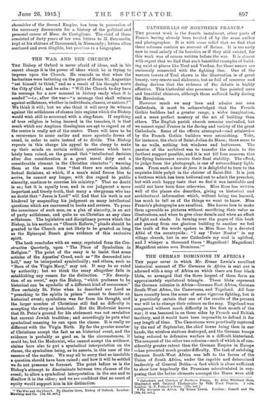MALE. DE CASTIGLIONR* THE reissue of M. Frederic Loliee's book
on the Countess de Castiglione, skilfully translated by Mr. W. Morton Fullerton, shows an abiding public interest in the career of one of the moat beautiful, most fantastic, and most unhappy women of the nineteenth century. Headers of the same author's Women of the Second Empire, in its way a brilliant book, which appeared a few years ago, will not have forgotten that the first name on the dazzling list was that of Virginia Oldoini, Countess de Castiglione ; neither will they have forgotten the various portraits, in fancy dress and otherwise, which gave an idea of even more exquisite beauty than either of those in the present volume. There one could trace changes which saddened no one so much as the Countess herself ; and yet the latest picture, with its wistful consciousness of lost youth and loveliness, had a pathos of its own which gave it an attraction absent from earlier ones. There can be no doubt that Mme. de Castiglione did not pitch her claim much too high when she described herself as the most beautiful woman of the century.
And hers was not onlythe beaubi de diable of form, feature, and colouring which is sometimes coexistent with mental stupidity. Mme. de Castiglione was no pretty fool, but a woman of brains and capacity. She claimed the title of "maker of Italy," and this was not so absurd as it sounds, for her mission from Cavour to Napoleon III., if of the nature of a backstairs intrigue, was none the less a real diplomatic mission, and undoubtedly gained its object of attracting the Emperor to the cause of Italian unity. "Succeed, my cousin, by any means you please. Only succeed I" thus wrote Cavour to the lovely girl, not yet twenty, and already separated from her husband, whom he sent to Paris at "the most brilliant moment of the Second Empire." She did succeed, as far as the Emperor's character would allow ; for a short time her influence was all-powerful; and the Peace of Villafranca was as keen a disappointment to her as to Cavour himself.
It is known that after the fall of the Empire Mme. de Castiglione devoted all her efforts, all her enchantments, to the restoration of monarchy in France, and for many years the Princes of the House of Orleans, notably the Due d'Aumale and his nephew the Duo de Chartres ("Robert le Fort "), were among her most intimate friends. But her hopes of every kind were doomed to disappointment. As one ambition after another proved illusive, as one friend after another fell away, as beauty faded and poverty threatened, Mme. de Castiglione drifted into the eccentric and solitary existence of her last twenty years. They were spent entirely in Paris, the home of her soul, though she was often known to regret those beautiful and rather dream-like Italian estates, her legal claim to which seems to have been as mysterious as the rest of her personal affairs. The first stage of this period was spent in the Place Vend6rue, and Princes and nobles still remembered to visit her apartment there. A later and sadder dwelling was in the Rue Cambon, and there her life was desolate indeed, almost forsaken and forgotten, even by such a faithful old friend as Louis Estancelin, the Royalist Deputy, for years her devoted admirer.
Among all the tragedies caused by the Second Empire and its fall, among all the bright intellects eclipsed, the brilliant lives veiled in scandal and degradation, there were few more striking than that of Mme. de Castiglione. She was a woman of singular gifts and originality : in better bands than those which misdirected her youth and spoiled her later years she might have shown her best side and. done some real good in the world. As it was, her beauty and attractiveness proved a curse to a nature not without distinction: the early triumphs which seemed to justify ambition and self-absorption, having faded away, left a discontented, restless, miserable being, more than slightly deranged, who lived in an atmosphere of suspicion and wandered the streets of Paris by night in eccentric garments, visiting her old haunts like a solitary phantom.
It is only quite recently that M. Loliee, the untiring
• Ti,, Roman. of a Favourite. By Frdddrie Lolide. Translated by W. Morton Fullerton. illustrated. London Constable and Co. Ps. 6d. aat..1
chronicler of the Second Empire, has been in possession of the necessary documents for a history of the political and personal career of Mme. de Castiglione. The chief of these consisted of forty years of her own letters to II. Estancelin, kept at his chateau of Baromesnil, in Normandy ; letters often confused and even illegible, hut precious to a biographer.















































 Previous page
Previous page